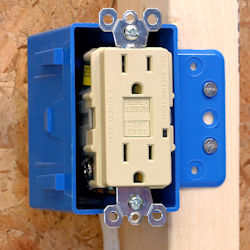Ground Fault Circuit Interrupters (GFCI)
A ground fault circuit interrupter, or GFCI, is an inexpensive lifesaver.
GFCIs detect any difference in current between the two circuit wires (the black wires and white wires). This difference in current can occur when electrical equipment is not working correctly, causing leakage current. If leakage current (a ground fault) is detected in a GFCI-protected circuit, the GFCI switches off the current, protecting you from a dangerous shock.
More important points to remember:
- GFCIs are set at about 5 mA and are designed to protect workers from electrocution.
- GFCIs are able to detect the loss of current resulting from leakage through a person who is beginning to receive a shock. If this situation occurs, the GFCI switches off the current in the circuit.
- GFCIs are different from circuit breakers because they detect leakage currents rather than overloads.
Circuits with missing, damaged, or improperly wired GFCIs may allow you to receive a shock.
Knowledge Check Choose the best answer for the question.
5-8. GFCIs detect any difference in _____ between the two circuit wires (the black wires and white wires).
You forgot to answer the question!

